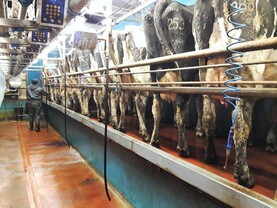Some wildflower seeds have been pulled from retail shelves this week due to contamination with blackgrass.
Germinal confirmed to the Irish Farmers Journal that a batch of wildflower seed mixtures sourced from England contained blackgrass.
The company said: “We take this issue very seriously and to prevent any further problems we have taken the decision to cease the sale of wildflower mixtures grown in England.”
Germinal is also asking anyone who has bought its wildflower mix to return the product. Where farmers have already planted they should either destroy the flowers or Germinal will inspect the patch on request.
While the EU seed regulations cover certain weed and disease species, there are no specific controls relating to blackgrass
The Department of Agriculture confirmed: “There are no EU certification regulations on wildflowers and their mixtures.
“While the EU seed regulations cover certain weed and disease species, there are no specific controls relating to blackgrass,” the Department noted, adding it was engaging with industry.
Highly invasive
Blackgrass is highly invasive and has been described as worse than foot-and-mouth for tillage because it can devastate tillage farms, it moves about very easily and seeds can remain in the soil for many years.

Blackgrass heads flowering in a crop of winter barley.
To put the risk into perspective, just one plant can produce 6,000 seeds.
The contamination raises huge worries in the tillage industry and has highlighted the lack of regulation on certain seeds coming into the country, which has been a concern of the tillage industry for many years .
Wildflower planting rates have increased considerably in 2021
Commenting on the use of imported wildflower seeds, Matthew Jebb, director of the National Botanic Gardens, said: “It [blackgrass] is widespread in the UK and the risk of importing non-native wildflower seed presents a considerable risk of importing both new species to Ireland, but also genetic material that may be different to our native populations.”
Wildflower planting rates have increased considerably in 2021 with the help of industry-led initiatives from companies including Glanbia and Keelings.
Glanbia warned tillage farmers to “be extra careful about what they sow along field margins and stick to pollinator mixes that only include certified seed”.
Keelings said it only sources natively produced seed from Carlow grower Sandro Cafolla, who takes measures to ensure crops are protected from external blackgrass contamination.
This includes the destruction of all crops within 10 metres of a roadside on his farm.
Some wildflower seeds have been pulled from retail shelves this week due to contamination with blackgrass.
Germinal confirmed to the Irish Farmers Journal that a batch of wildflower seed mixtures sourced from England contained blackgrass.
The company said: “We take this issue very seriously and to prevent any further problems we have taken the decision to cease the sale of wildflower mixtures grown in England.”
Germinal is also asking anyone who has bought its wildflower mix to return the product. Where farmers have already planted they should either destroy the flowers or Germinal will inspect the patch on request.
While the EU seed regulations cover certain weed and disease species, there are no specific controls relating to blackgrass
The Department of Agriculture confirmed: “There are no EU certification regulations on wildflowers and their mixtures.
“While the EU seed regulations cover certain weed and disease species, there are no specific controls relating to blackgrass,” the Department noted, adding it was engaging with industry.
Highly invasive
Blackgrass is highly invasive and has been described as worse than foot-and-mouth for tillage because it can devastate tillage farms, it moves about very easily and seeds can remain in the soil for many years.

Blackgrass heads flowering in a crop of winter barley.
To put the risk into perspective, just one plant can produce 6,000 seeds.
The contamination raises huge worries in the tillage industry and has highlighted the lack of regulation on certain seeds coming into the country, which has been a concern of the tillage industry for many years .
Wildflower planting rates have increased considerably in 2021
Commenting on the use of imported wildflower seeds, Matthew Jebb, director of the National Botanic Gardens, said: “It [blackgrass] is widespread in the UK and the risk of importing non-native wildflower seed presents a considerable risk of importing both new species to Ireland, but also genetic material that may be different to our native populations.”
Wildflower planting rates have increased considerably in 2021 with the help of industry-led initiatives from companies including Glanbia and Keelings.
Glanbia warned tillage farmers to “be extra careful about what they sow along field margins and stick to pollinator mixes that only include certified seed”.
Keelings said it only sources natively produced seed from Carlow grower Sandro Cafolla, who takes measures to ensure crops are protected from external blackgrass contamination.
This includes the destruction of all crops within 10 metres of a roadside on his farm.







 This is a subscriber-only article
This is a subscriber-only article









SHARING OPTIONS: